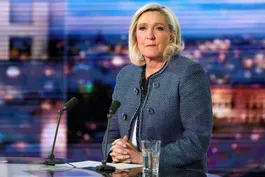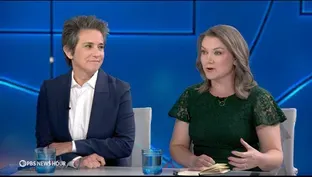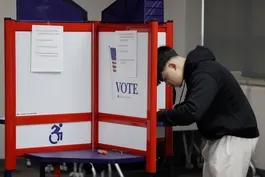
Trump deports more immigrants amid battle with judiciary
Clip: 3/31/2025 | 7m 56sVideo has Closed Captions
Trump administration deports more immigrants to El Salvador amid battle with judiciary
The State Department deported more immigrants to El Salvador over the weekend. Secretary of State Marco Rubio called the removals a “successful counter-terrorism operation.” It comes after a federal judge had blocked the administration from invoking a rare wartime authority to deport hundreds of migrants without due process. William Brangham discussed more with Deborah Pearlstine.
Problems with Closed Captions? Closed Captioning Feedback
Problems with Closed Captions? Closed Captioning Feedback
Major corporate funding for the PBS News Hour is provided by BDO, BNSF, Consumer Cellular, American Cruise Lines, and Raymond James. Funding for the PBS NewsHour Weekend is provided by...

Trump deports more immigrants amid battle with judiciary
Clip: 3/31/2025 | 7m 56sVideo has Closed Captions
The State Department deported more immigrants to El Salvador over the weekend. Secretary of State Marco Rubio called the removals a “successful counter-terrorism operation.” It comes after a federal judge had blocked the administration from invoking a rare wartime authority to deport hundreds of migrants without due process. William Brangham discussed more with Deborah Pearlstine.
Problems with Closed Captions? Closed Captioning Feedback
How to Watch PBS News Hour
PBS News Hour is available to stream on pbs.org and the free PBS App, available on iPhone, Apple TV, Android TV, Android smartphones, Amazon Fire TV, Amazon Fire Tablet, Roku, Samsung Smart TV, and Vizio.
Providing Support for PBS.org
Learn Moreabout PBS online sponsorshipWILLIAM BRANGHAM: The State Department deported 17 more immigrants to El Salvador over the weekend.
They were allegedly members of a Venezuelan gang.
Secretary of State Marco Rubio called the removals a -- quote -- "successful counterterrorism operation."
This occurred after a federal judge had blocked the administration from invoking a rare wartime authority to deport hundreds of immigrants without due process.
The president was sharply critical of that judge.
And it comes as he's also taken aim at major law firms for representing clients or cases that conflict with his administration.
For more, we are joined now by Deborah Pearlstein.
She's director of the Princeton Program on Law and Public Policy.
Deborah Pearlstein, thank you so much for being here.
Could you help us understand how the administration is continuing these deportations?
We had one judge say, I'm going to block you from doing -- using this Alien Enemies Act to deport people.
And then another judge on Friday said, you can't deport people who don't have some national connection to the countries you're sending them to.
So how are these deportations continuing?
DEBORAH PEARLSTEIN, Princeton University: So thanks for having me.
The first thing to say is, we don't fully know or know at all what legal basis the president is invoking to continue these deportations.
That's in part by design.
It makes it harder to challenge the legality of what he's doing.
But there's several possibilities of what's going on here.
One possibility with the recent deportations of more alleged Venezuelans over the weekend is that the president is continuing to use authority under the Alien Enemies Act, which he invoked before.
If that's what's going on, that would be in direct defiance of an ongoing temporary restraining order that was put in place by a district court in Washington, D.C., that's still in place, that was upheld on appeal, that was recently extended to April.
But the State Department today refused to confirm or deny whether, in fact, it was the Alien Enemies Act that the president was acting under.
There are and long have been under existing laws and statutes in the United States authority to deport people for various reasons, as long as they are entitled to some process under the law.
But we can't even tell that, whether the people have had that kind of process.
And that's why there's undoubtedly going to be ongoing litigation here as well.
WILLIAM BRANGHAM: That's part, perhaps, why we saw some different justifications for it, that the secretary of state called it a counterterrorism operation, and then another administration official said that this was just under the regular course of immigration law.
The Trump administration, as you mentioned, one of their appeals, they have taken this all the way to the Supreme Court, this injunction about the Alien Enemies Act.
How does this pushback fit into this larger, quite intense tug-of-war between the administration and the judiciary?
DEBORAH PEARLSTEIN: So we're really seeing a wide-scale attack by the administration against not just the courts and individual judges, but against legal institutions across the board, law schools, bar associations, individual attorneys, and, in recent weeks, large corporate law firms as well.
The courts and lawyers have proven among the most effective so far institutions in pushing back against some of the president's initiatives, particularly some of the president's unconstitutional initiatives.
And so what we're seeing is, instead of efforts to simply comply with those court orders, we're seeing some compliance, but we're also seeing enormous attacks against the institutions themselves and the rule of law.
That's one of the things that worries not just constitutional law professors, but should worry all Americans, I think, most.
WILLIAM BRANGHAM: We saw the administration also fired two line prosecutors, which is somewhat of an unusual move for the administration to do.
These are the lawyers in Department of Justice offices nationwide who are working particular cases.
But I want to loop back to this point you were mentioning before about the move against major law firms.
I mean, we have seen the administration targeting several firms, extracting concessions from others.
Help us understand, why are they doing that?
What is behind that effort, in your view?
DEBORAH PEARLSTEIN: So they seem to be targeting these firms, and they're doing it through sort of executive pronouncements.
They call them executive orders, but they're not executive orders in any traditional sense.
And they're targeting firms expressly because they say these firms have hired or employed lawyers who took positions against the administration.
They represented Democratic political officials.
They took on representation of people who were advocating for transgender individuals, right?
And so the administration is expressly saying, if you do these things, if you represent people we don't like, issues we don't like, we are going to, in the case of corporate law firms, strip lawyers there of security clearance, deny them access to federal buildings, including federal courthouses, and take other measures that effectively make it impossible for these firms to do business.
We're seeing a few, two firms in particular, try to strike deals with the administration to avoid the worst effects of these.
And we're seeing the courts consistently, three different judges, three different courts, strike down these orders as unconstitutional, I think rightly.
But in the meantime, the chilling effect that we're seeing across law firms, even those firms that haven't been targeted directly, is beginning to impact not so much the ability of corporate clients to get lawyers.
They are still able to get lawyers.
That are a lot of law firms out there.
But the willingness of firms to take on pro bono or even paid clients who are taking positions that the administration doesn't like.
This is a threat not just to the First Amendment rights of the firms and the lawyers who work there, but the ability of individuals to give effect -- the right of effective assistance of counsel under the Sixth Amendment.
That's part of the central reason why the courts are striking these down so quickly.
WILLIAM BRANGHAM: Do you think that that is a real fear?
Is there a real concern that -- again, these are some of the biggest and most powerful law firms in the country -- that they really will shy away from providing this counsel, which every person who goes before a court is allowed to have a lawyer?
You really think that that's going to happen?
DEBORAH PEARLSTEIN: So I have already heard multiple instances from people I know who work at these law firms, from nonprofit organizations who have sought the assistance of these law firms, which they have done for many, many years, saying they're less inclined to take on the cases.
One in particular says there was an instruction that went around in his firm saying, you can work on these pro bono matters, but don't put the firm's name on the brief if you do.
So we're already seeing that happen in certain cases.
Whether or not that becomes widespread, I think we have to wait and see.
But there's no question that these orders, even though they're being struck down quickly in the courts, are already starting to have, at least to some extent, a chilling effect on the willingness of some of the best lawyers in the country and in the world to take on some of the most important cases that are out there now.
WILLIAM BRANGHAM: All right, Deborah Pearlstein of the Princeton Program on Law and Public Policy, thank you so much for joining us.
DEBORAH PEARLSTEIN: Thank you.
After Myanmar earthquake, China fills vacuum left by USAID
Video has Closed Captions
After devastating earthquake in Myanmar, China filling vacuum left by USAID's absence (9m 34s)
Examining claims tariffs will revitalize U.S. manufacturing
Video has Closed Captions
Examining Trump's claims that tariffs will revitalize American manufacturing (7m 42s)
News Wrap: Le Pen banned from public office after conviction
Video has Closed Captions
News Wrap: Le Pen banned from public office in France after embezzlement conviction (4m 20s)
Scientists sound alarm on Trump's research funding cuts
Video has Closed Captions
Scientists sound alarm on Trump administration's dismantling of research funding (6m 44s)
Tamara Keith and Amy Walter on Florida, Wisconsin elections
Video has Closed Captions
Tamara Keith and Amy Walter on what this week's elections mean for Trump and Democrats (8m 29s)
Wisconsin Supreme Court election highlights political divide
Video has Closed Captions
Wisconsin Supreme Court election highlights deep political divides in battleground state (6m 50s)
Providing Support for PBS.org
Learn Moreabout PBS online sponsorshipMajor corporate funding for the PBS News Hour is provided by BDO, BNSF, Consumer Cellular, American Cruise Lines, and Raymond James. Funding for the PBS NewsHour Weekend is provided by...

















